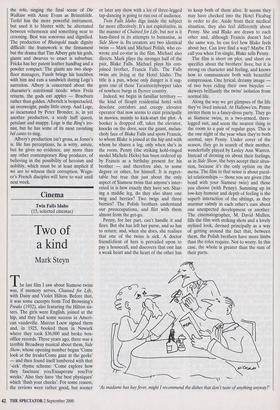Cinema
Two of a kind
Mark Steyn
The last film I saw about Siamese twins was, if memory serves, Chained for Life, with Daisy and Violet Hilton. Before that, it was some excerpts from Tod Browning's Freaks (1932), also featuring the Hilton sis- ters. The girls were English, joined at the hip, and they had some success in Ameri- can vaudeville. Marcus Loew signed them and, in 1925, booked them in Newark where they took $36,000 and broke box- office records. Three years ago, there was a terrible Broadway musical about them, Side Show, whose opening number began 'Come look at the freaks/Come gaze at the geeks' — and then found itself lumbered with that `-eek' rhyme scheme: 'Come explore how they fascinate you/Exasperate you/For weeks.' Also they have 'the best physiques' which 'flush your cheeks'. For some reason, the reviews were rather good, but sooner or later any show with a lot of three-legged tap-dancing is going to run out of audience.
Twin Falls Idaho digs inside the subject far more effectively. It's not exploitative, in the manner of Chained for Life, but nor is it ham-fisted in its attempts to humanise, as Side Show is. Its creators are two identical twins — Mark and Michael Polish, who co- wrote and co-star in the film. Michael also directs. Mark plays the stronger half of the pair, Blake Falls. Michael plays his con- joined brother, Francis Falls. The Falls twins are living at the Hotel Idaho. The title is a pun, whose only danger is it sug- gests one of those Taranteenybopper tales of nowhere burgs in flyover country.
Indeed, we begin in familiar territory the kind of fleapit residential hotel with desolate corridors and creepy elevator operator that now seems to exist principally in movies, mainly to kick-start the plot. A hooker is dropped off, takes the elevator, knocks on the door, sees the gaunt, melan- choly face of Blake Falls and spots Francis, to whom Blake is joined at the hip and with whom he shares a leg, only when she's in the room. Penny (the striking kohl-ringed model Michele Hicks) has been ordered up by Francis as a birthday present for his brother — and therefore also, to some degree or other, for himself. It is regret- table but true that just about the only aspect of Siamese twins that anyone's inter- ested in is how exactly they have sex. Shar- ing a middle leg, do they also share one twig and berries? Two twigs and three berries? The Polish brothers understand our preoccupations, and flirt with them almost from the get-go.
Penny, for her part, can't handle it and flees. But she has left her purse, and so has to return; and, when she does, she realises that one of the twins is sick. A doctor friend/client of hers is prevailed upon to pay a housecall, and discovers that one has a weak heart and the heart of the other has to keep both of them alive. It seems they may have checked into the Hotel Fleabag in order to die. Aside from their medical situation, they also feel differently about Penny. She and Blake are drawn to each other and, although Francis doesn't feel the same way, he can feel how Blake feels about her. Can love find a way? Maybe I'll call you when I'm single, Blake tells Penny.
The film is short on plot, and short on specifics about the brothers' lives; but it is strong on character and feeling, and knows how to communicate both with beautiful compression. One lyrical, dreamy image of two boys riding their own bicycles skewers brilliantly the twins' isolation from normal life.
Along the way we get glimpses of the life they've lived instead. At Hallowe'en, Penny invites them to a fancy-dress party. They go as Siamese twins, in a two-armed, three- legged suit, and seem the nearest thing in the room to a pair of regular guys. This is the one night of the year when they're both normal, says Penny. Under cover of the season, they go in search of their mother, wonderfully played by Lesley Ann Warren. Instead of droning on about their feelings, as in Side Show, the boys accept their situa- tion, because it's the only option on the menu. The film in that sense is about paral- lel relationships — those you are given (the bond with your Siamese twin) and those you choose (with Penny). Summing up its low-key humour and depth of feeling is the superb interaction of the siblings, as they murmur calmly in each other's ears about one unexpected development or another. The cinematographer, M. David Mullen, fills the film with striking shots and a lovely stylised look, devised principally as a way of getting around the fact that, between them, the Polish brothers have more limbs than the roles require. Not to worry. In this case, the whole is greater than the sum of their parts.
'As madame has hay fever, might I recommend the dishes that don't taste of anything anyway?'


























































 Previous page
Previous page